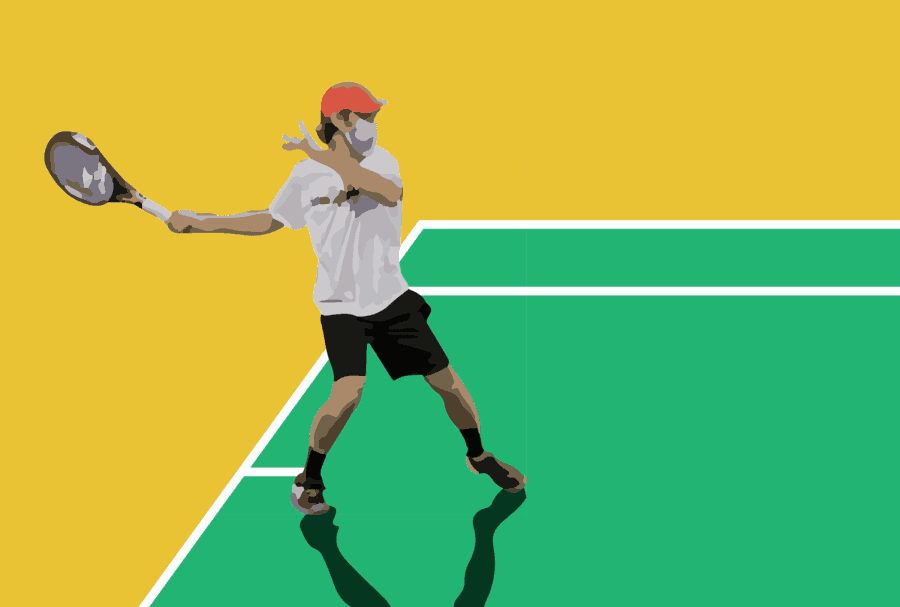‘Remaining safe’: These are the plans student orgs have in place for spring
Some will go online, others will mask up. But many of them are stuck waiting for the University’s moratorium on in-person events to come to a close.
More stories from Maria Grenyo
The University’s club tennis program is willing to mask up if that’s what it takes to hit the court.
Throughout the day, UA students spill out of academic buildings and onto the Quad, then into dining halls or into the Ferguson Student Center, filling the spaces with a cacophony of clacking footsteps, joyful chatter and the rustling of fast food wrappers.
At night, however, campus is quiet. During the time when students usually would be attending club meetings or hosting events, they are instead sitting at home or in their dorms waiting for the University’s moratorium on organization events to end.
This year, the SOURCE, a division of the Office of Student Involvement that provides resources, support and recognition for registered student organizations, is in charge of communicating COVID-19 regulations on organization gatherings.
During this spring semester, the SOURCE will continue to limit in-person events by requiring organizations to register every event, on-campus and off-campus, with the University and requiring attendees to wear masks and social distance.
According to the UA social event guidelines for student organizations, organizations that break these rules “shall be subject to all of the disciplinary provisions of the Code of Student Conduct and, depending on the violation, may also be personally subject to separate criminal and/or civil liability.”
Student organizations have been working hard to follow these restrictions.
Organizations such as Bama Tutors for Service and Al’s Pals spent the fall semester adapting to COVID-19 restrictions. These COVID-19 adjustment measures meant moving completely to virtual platforms like Zoom.
Bama Tutors for Service and Al’s Pals usually send college students into Tuscaloosa grade schools and high schools to tutor younger students. These college students serve as guides, both personally and academically.
“I always thought of it as a mentorship,” said Jacob Smith, a senior majoring in microbiology and the former president of Bama Tutors for Service.
Last semester, mentors moved to video-conferencing because they were not allowed in Tuscaloosa public schools. Prior to the pandemic, the organization met in the Tuscaloosa Public Library.
“It’s been going very well,” Smith said. “We were a little rusty in the beginning.”
The club has adapted to the online format, and many students are still attending the sessions. Smith said that although it seems the club will not meet again in person during the spring semester, he hopes the club will be back with students eventually.
“The plan would be to get back in person as soon as possible,” Smith said.
Another tutoring service, Al’s Pals, experienced the same challenges.
“When we give them a mentor, we give them a constant in their life, who is supporting them in anything they’re going through.” Abigail Payne, a senior majoring in computer science and electrical engineering, said.
Payne is the president of Al’s Pals, an organization that focuses specifically on pairing grade schoolers with college students for academic learning.
Mentors in Al’s Pals used to travel to Tuscaloosa grade schools to work one-on-one with students. Since last semester, Al’s Pals members have been using Microsoft Teams and Zoom to work in small groups with students.
“The technology that we have and the experience that we have from running these virtual platforms is giving us a really unique opportunity,” Payne said.
Payne added that it has likely been decided that Al’s Pals will remain remote in the coming semester as well. The organization will continue to mentor virtually and hopes to expand their reach. Payne specifically mentioned opportunities to connect with students in more rural areas.
Unlike tutoring clubs, club sports made adjustments to gather in-person safely. This included social distancing and wearing masks during practices.
“We were kind of the model for other club sports to start practicing”, said Juliana Strobing, a second year graduate student studying public administration and the president of the UA club tennis team.
At the beginning of the fall semester, Strobing and her club had to figure out how to have successful and safe practices.
“[The United States Tennis Association], who hosts all the tournaments, is planning on doing tournaments for the spring, and we are actually supposed to host one at Alabama in February,” Strobing said.
She added that UA club tennis is still trying to work with UA officials to confirm that competitions will be allowed in the spring.
“I’m pretty proud to be part of an organization that led the movement to start being able to safely practice. Club sports, for me, have been basically my entire college experience, so I’m glad that I can allow people to have that experience that I had while still remaining safe from the virus,” Strobing said.
Organizations are now well-prepared to take on a new semester after making these adjustments during the fall. Per Vice President of Student Life Myron Pope, it’s unclear when the moratorium on in-person events will run its course.



